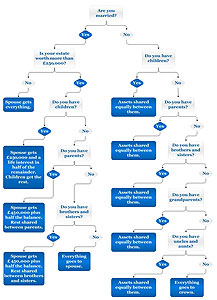
Why Do I Need a Will?
Die without a Will in place and your affairs can be kept in limbo for years. Yet many either don't want to think about it or are worried about the cost.
You must be aware that not making a Will could leave behind big financial problems for your Family at an already difficult time, possibly as severe as being unable to pay the bills as the bank's locked off the money.
So whatever your age, if you have assets, eg. a house, savings, or a business, and it is important to you to provide correctly for your loved ones after your death, then you really should consider making a will.
While thinking, talking & planning for death may feel uncomfortable, you need to consider how much worse the situation would be if you died without sorting it.
There are many specific reasons to write a Will including:
Who can make a Will?
Quite simply anyone over the age of 18 who is of sound mind however:
This is called dying Intestate. There are specific rules of intestacy which set out who will inherit and how much, if you do not leave a valid will, this may not be what you would have wished ... do see our flowchart below (click the image to enlarge).
Thousands of people die each year without having a valid Will, known as intestacy, making it complex for all family left behind, especially if you are not married. If this happens to you, there are strict rules on what will happen to your estate and it could leave someone you want to look after with absolutely nothing, or with a lot less than you had thought.
How do you store a Will?
Once you've created a will, it is vitally important to store it safely, as you will need the original documents, and in good order, hopefully at a very long time in the future. You can choose to store the Will yourself, however we strongly recommend that this be in a Fireproof & Waterproof Storage area, like a Safe. Alternatively we can store it for you at a very reasonable cost
Do debts die with you?
This is commonly held myth. While it's true to an extent, as always with these things it's a lot more complex than that.
If you have debts including credit card, loan or mortgage balances, then that amount will come out of your estate before your beneficiaries will get the money. If you don't have any assets at all then the debts will be written off. Here are two simplified examples to help explain it:
Inheritance Tax (or commonly known as a Death Tax) is what you (or technically your estate) has to pay if the value of your estate exceeds the government's threshold, currently £325,000 per person.
Anything above this limit is taxed at 40%, so can cost loved ones hundreds of thousands in the event of your death. It is also the first debt to be paid by your estate,and in full, before your loved ones can receive their monies.
Yet it's possible to legally avoid huge swathes of it, or possibly pay none at all.
What is a Living Will, and why may I need one?
It's not just when you die that having a Will can come in useful.
Everyone should consider having a living will to say who should look after their finances or make decisions on their health care if they are no longer in a fit state to make that decision on their own behalf.
If you find yourself in this position; Or if you know that's coming, due to dementia, mental illness or being in an accident., you can put into place what is called a Lasting Power of Attorney.
If you have no living will or Lasting Power of Attorney, and this happens to you, the responsibility for looking after your health care and estate can take much longer and at a much higher cost to you.
If you've nothing in place, your family will need to apply for a court order, which can take years to process, to get back in control of your estate.
So whatever your age, if you have assets, eg. a house, savings, or a business, and it is important to you to provide correctly for your loved ones after your death, then you really should consider making a will.
While thinking, talking & planning for death may feel uncomfortable, you need to consider how much worse the situation would be if you died without sorting it.
There are many specific reasons to write a Will including:
- Children: If you have children or step-children under 18, you should choose who will look after them if both parents were to pass away together, and ensure there are funds to help.
- Unmarried couples: The law doesn't really recognise this, so without a will don't expect anything to automatically go to your partner.
- Divorced: You may want to update your Will to ensure it accurately reflects your new situation
- Pets: Decide what should happen to family pets.
- Specific funeral plans: If you know what you want your funeral to be like, you can detail it so that your family doesn't have to make the decisions at an already difficult time for them.
- Property: 'Joint tenant' mortgages automatically pass to the other owner but if you've a 'Tenants in common' mortgage it's important to say what happens to your share of the house. Also If you own a property overseas, inheritance laws in that Country are likely to be different to the UK so the correct action must be taken to ensure your Overseas Asset is correctly dealt with.
- Change in circumstances: Update your will when you marry, divorce or have children to ensure at all times that your change in circumstances is correctly documented.
- Small business: It's possible with sole directors, that if you die without executors no one can make decisions to authorise payments (including to staff), so your business could collapse.
Who can make a Will?
Quite simply anyone over the age of 18 who is of sound mind however:
- it is possible for members of the armed forces to make a Will under the age of 18 (advice should be sought in these circumstances)
- under the provisions of the Mental Health Act 1983, the Court of Protection may approve the making of a Will, or a Codicil to a Will for someone who is mentally incapable of doing so themselves. Guidance about how a mentally incapable person can make a Will can be obtained from the Public Guardianship Office website (http://www.publicguardian.gov.uk).
This is called dying Intestate. There are specific rules of intestacy which set out who will inherit and how much, if you do not leave a valid will, this may not be what you would have wished ... do see our flowchart below (click the image to enlarge).
Thousands of people die each year without having a valid Will, known as intestacy, making it complex for all family left behind, especially if you are not married. If this happens to you, there are strict rules on what will happen to your estate and it could leave someone you want to look after with absolutely nothing, or with a lot less than you had thought.
How do you store a Will?
Once you've created a will, it is vitally important to store it safely, as you will need the original documents, and in good order, hopefully at a very long time in the future. You can choose to store the Will yourself, however we strongly recommend that this be in a Fireproof & Waterproof Storage area, like a Safe. Alternatively we can store it for you at a very reasonable cost
Do debts die with you?
This is commonly held myth. While it's true to an extent, as always with these things it's a lot more complex than that.
If you have debts including credit card, loan or mortgage balances, then that amount will come out of your estate before your beneficiaries will get the money. If you don't have any assets at all then the debts will be written off. Here are two simplified examples to help explain it:
- Debts £100,000, no assets. This is simple, you've nothing to leave and no one has to take the debts.
- Debts £40,000, you own a £200,000 home. Here the debt will need paying or sorting from the estate before the person you left the home to can take it.
Inheritance Tax (or commonly known as a Death Tax) is what you (or technically your estate) has to pay if the value of your estate exceeds the government's threshold, currently £325,000 per person.
Anything above this limit is taxed at 40%, so can cost loved ones hundreds of thousands in the event of your death. It is also the first debt to be paid by your estate,and in full, before your loved ones can receive their monies.
Yet it's possible to legally avoid huge swathes of it, or possibly pay none at all.
What is a Living Will, and why may I need one?
It's not just when you die that having a Will can come in useful.
Everyone should consider having a living will to say who should look after their finances or make decisions on their health care if they are no longer in a fit state to make that decision on their own behalf.
If you find yourself in this position; Or if you know that's coming, due to dementia, mental illness or being in an accident., you can put into place what is called a Lasting Power of Attorney.
If you have no living will or Lasting Power of Attorney, and this happens to you, the responsibility for looking after your health care and estate can take much longer and at a much higher cost to you.
If you've nothing in place, your family will need to apply for a court order, which can take years to process, to get back in control of your estate.
Copyright © 2012
- 2025
Bradgate Inheritance - Specialist Trust and Estate Planning Services.






